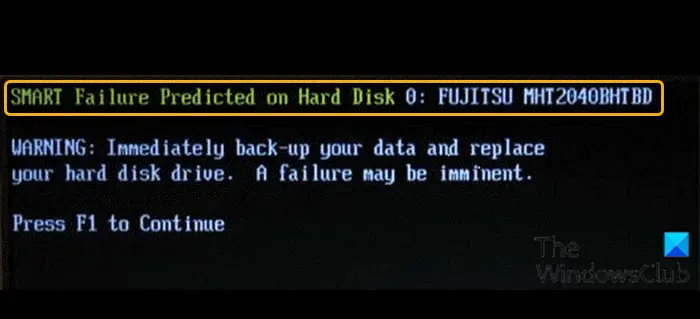When you encounter this issue, you’ll receive the following similar full error message; This error indicates that the hard disk present in your personal computer will cease to function properly. It could either take many days in a row, or maybe a month or so, but it will happen nevertheless. You may encounter this error due to one or more of the following reasons:
OverheatingShockBad sectorsDrive not defragmentedImproper shut down of the systemVirus attackMisconfigured or outdated BIOSPhysical damage to the hard driveFailure of SMART hard disk checkBroken SATA/IDE controller chip present on the motherboard
SMART is a self-diagnostic tool that is embedded in your hard drive (HDD) or solid-state drive (SSD). It serves the purpose of monitoring continuously drive conditions, including error rates and performance while reporting its result to the computer system. Using predictive failure analysis, it essentially reports if a failure on the hard disk is about to happen as opposed to an actual failure.
SMART Failure Predicted on Hard Disk
If you’re faced with this issue, you can try our recommended solutions in the order presented below to resolve the issue. Let’s take a look at the description of the process involved concerning each of the listed solutions. Since you cannot boot Windows normally, you may have to try and boot in Safe Mode or into Advanced Startup options screen to be able to carry out the fixes. You will need to make use of the Command Prompt. For some strange reason if you can boot in Safe Mode but cannot access the Advanced Startup Options screen, when in Safe Mode, you may use the Command Prompt to boot Windows 10 directly to Advanced Startup Settings screen.
1] Check Drive Status
The first thing you should try when you get this SMART Failure Predicted on Hard Disk message on your Windows 11/10 PC is to check the drive Health status – depending on the result, you may no other option but to back up your data and replace the drive – afterward, you can then reinstall Windows 10 and restore your backed up files/data.
2] Run CHKDSK
If the result of the drive status is OK, then you can proceed with this solution which is to run CHKDSK to fix bad sectors, and see if the issue is resolved.
3] Defragment Drive
This solution simply requires you to defragment the drive and see if that resolves the issue. If you continue seeing this message, it might be a good idea to check if you need to replace your hard disk. You should immediately back up your data and replace your hard disk drive as a hard disk failure may be imminent. Related post: 1720 SMART Hard Drive detects imminent failure.

